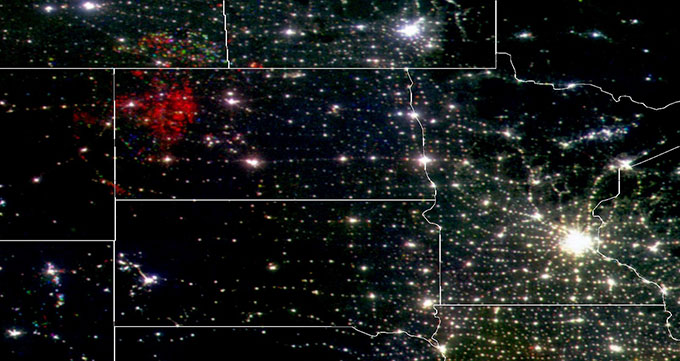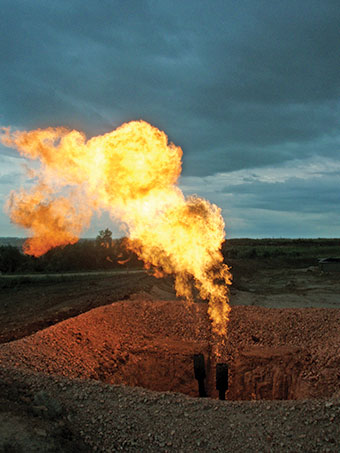An Inconvenient Choice
by Bruce Fisher


Fracking, flaring, and surviving hard life on the rez
Up in the drought-stricken and economically marginalized northern part of North Dakota, there’s an oil boom underway. The US Geological Service estimates that the Bakken Formation holds over 3.65 billion barrels of recoverable oil. Until 2008, production was small, and centered mainly around Minot, whose main connection to the outside world had previously been mainly through the nearby Air Force base.
Then the extraction technique known as hydraulic fracturing—fracking—abruptly began changing the economic, social, and ecological landscape. The Bakken Formation holds oil, and also natural gas, but the infrastructure for transporting the gas doesn’t yet exist, so the drillers just flare it off—they burn it. The night sky of North Dakota used to be dark. It is now bright. And the question that now faces the Assiniboine and Dakota people who live just west of the border of Montana-North Dakota border is whether their sky, too, will get bright, because the Bakken Formation extends under most of the Fort Peck Indian Reservation.
Northeast Montana is home to around 15,000 indigenous people who have a very precarious connection to the new global economy. About half the working-age population is out of the workforce. Many adults who were employed in ranching and farming have been displaced by persistent drought conditions that are mitigated by extensive irrigation ditches used to channel fresh water from the Missouri River. The Fort Peck Community College in Poplar has a successful training program that has graduated a few dozen people a year for oil-field jobs, but those jobs aren’t on the rez, but rather over in the North Dakota “man towns” of the Bakken boom. The scene there, according to a former Fort Peck Reservation president: expensive temporary housing, high pay, prostitutes from the Fort Berthold Reservation who are frequently beaten up, instant millionaires who make their money selling to the transients, big corporations that take the money back to where they’re form, and politicians scrambling to open every regulatory door for more, more, more production.
This coming week, officials as high as the secretary of the interior herself will be in northeast Montana to talk to the Assiniboine and Dakota leadership about doing for the Fort Peck Reservation what fracking the Bakken Formation has done for North Dakota.
“We supposedly have as much oil as Kuwait,” the former Fort Peck Reservation president said. “But we don’t know what fracking will do to our water, our land, our environment, our people.”
The contrast
Meanwhile, the fracking debate in New York State grinds on. But the geologists and the petroleum industry experts have weighed in: There is strong evidence that the debate in New York is over a nullity, and is merely a rhetorical exercise, because those parts of the Marcellus and Utica shale formations that lay below New York State do not contain recoverable quantities of natural gas, and contain no oil at all.
Here, the debate is like a pair of political hamster-wheels set side by side. The Right gets to blame environmentalists for preventing an Upstate version of the economic bonanza that has wiped out North Dakota’s unemployment and created fortunes for some members of the Mandan, Hidatsa, and Arickara tribes—at least those who can lease their mineral rights—and jobs for thousands of people from the high plains. The Left gets to defend Upstate farmers, brewers, second-home owners, and their own reputation as effective stewards of irreplaceable watersheds.
The reality is that, because there’s no here here, the fight is a pair of team-building efforts, something like identity politics.
The real issues
The real issues are elsewhere, but they connect here, and they’re huge:
• Transporting the volatile crude oil from North Dakota, like transporting the volatile crude bitumen from the enormous Canadian tar sands of northern Alberta, means loading up railroad tank-cars with stuff that can spill, leak, and create the risk of many more explosions like the one that killed dozens in the resort town of Lac Megantic, Quebec, one night last summer.
• Using this oil means changing American foreign policy, probably forever, in ways that delight isolationists but scare internationalists, especially those who care deeply about the survival of Israel and of the US-European Union alliance, and possibly also the American-dominated globalized trade system.
• Getting to the fracked natural gas in Pennsylvania has now produced a new surge of interest in changing long-standing US export rules so that producers can sell overseas.
• But producing these fossil fuels means accelerating the production of greenhouse gases, and that means accelerating their effects, because all this new production releases more methane and more carbon dioxide than old-style oil production—and places more and more aquifers, streams, rivers, lakes, and farmland at risk of permanent contamination, because no matter what the pro-frackers say, the evidence is incontrovertible: Fracking dirties up the land and water wherever fracking happens.
The discussion in Montana will probably culminate in a decision to extend extraction to the Bakken formations under the rez. The promise, as always, will be that the economic benefit to the under-employed indigenous peoples will far outweigh any damage to their land and their water. None of the published reports disagree that there are a couple of billion barrels of oil out there. The survival issues for them are pointed and immediate. What we have to think about is not whether fracking should happen here—it won’t—but about tougher stuff.
Bruce Fisher is director of the the Center for Economic and Policy Studies at Buffalo State College. His recent book, Borderland: Essays from the US-Canada Divide, is available at bookstores or at www.sunypress.edu.
blog comments powered by Disqus|
Issue Navigation> Issue Index > v13n11 (Week of Thursday, March 13) > An Inconvenient Choice This Week's Issue • Artvoice Daily • Artvoice TV • Events Calendar • Classifieds |









 Current Issue
Current Issue